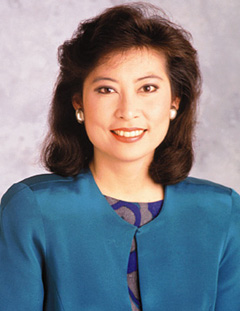GOLDSEA | ASIAMS.NET | ASIAN AMERICAN PERSONALITIES
ASIAN AMERICAN AIR FORCE
PAGE 9 OF 11
| "Working for CNN is like getting a masters in anchoring." |
GS: What does that do to your personal life?
EY: Working those long days and working seven days a week--that's not the damper on your personal life because those kinds of work schedules clear up and ease up a bit. So that doesn't hurt the social life or the personal life too much. What did make it difficult was when I was anchoring either the early morning show or the late-night newscast so my schedule was out of sync with everyone else. When I was at CNN, I did Daybreak which was 6 to 9 a.m. I'd go in at four in the morning and have a three-hour newscast and I'd be done before noon. But then everyone else is in the middle of a workday and by the time everyone else gets off work, I have to go to sleep to get up at two. More recently at KRON when I was working the five and eleven o clock newscasts, my evening hours were totally shot. You don't finish until 11:30. For most of us that's just too late to go out.
GS: When you graduated, did you immediately go into broadcasting?
EY: I interned and became a reporter for KITV while I was still in college.
GS: Part time?
EY: Full time, actually. It slowed my graduation. I graduated a semester late and continued working for half a year. Then I left the profession and went to Columbia University to get a masters.
GS: Why?
EY: I had been doing TV for almost three years by then. It's such a fast-paced profession and I was putting together three stories a day under deadline pressure. I felt it was a job that entailed a lot of responsibility and I just wanted to step back for a while and make sure I was doing what I really wanted to do.
GS: When did you go to Columbia?
EY: 1979.
GS: What was your salary when you left?
EY: I started at nine thousand. When I was working seven days, I'd report and anchor on weekends, and I was up to $18,000 with overtime.
GS: That isn't much to live on for Hawaii. When did you get your masters from Columbia?
EY: In 1980. Then I went to to KPTV in Portland, an independent. I anchored there for almost three years. That was a proverbial prime weekday anchor job.
GS: How did you like that?
EY: It was a really good experience and I love Portland. I was there when Mt Saint Helens erupted.
GS: What was your starting salary there?
EY: It was in the low 20s. I want you to know I'm not going to end up telling you what I make now.

GS: When did you learn how to groom yourself for TV?
EY: You learn as you go. You look at your air checks and you get advice from different people. Sometimes the station brings in a wardrobe consultant. In Portland and Hawaii I was on my own. I don't think I had one at CNN either. The first time I got one was when I came to San Francisco.
GS: Where did you go after Portland?
EY: To CNN in Atlanta in 1983.
GS: What was your starting salary?
EY: That was in the 30s.
GS: Why did you move?
EY: It was like my getting the masters at Columbia. Working for CNN is like getting a masters in anchoring. You really really learn it, you really go through the ropes. I had a three-hour newscast every morning. Whatever was happening around the world or in Washington or elsewhere in the country, you had to be prepared to go live and adlib and question reporters. PAGE 10
| PAGE 1 | 2 | 3 | 4 | 5 | 6 | 7 | 8 | 9 | 10 | 11 |
CONTACT US
|
ADVERTISING INFO
© 1996-2013 Asian Media Group Inc
No part of the contents of this site may be reproduced without prior written permission.
